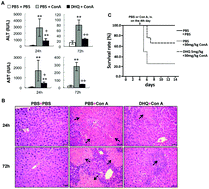当前位置:
X-MOL 学术
›
Food Funct.
›
论文详情
Our official English website, www.x-mol.net, welcomes your
feedback! (Note: you will need to create a separate account there.)
Pretreatment with dihydroquercetin, a dietary flavonoid, protected against concanavalin A-induced immunological hepatic injury in mice and TNF-α/ActD-induced apoptosis in HepG2 cells
Food & Function ( IF 5.1 ) Pub Date : 2018-03-06 00:00:00 , DOI: 10.1039/c7fo01073g Jiajie Chen 1, 2, 3, 4, 5 , Xu Sun 1, 2, 3, 4, 5 , Tingting Xia 1, 2, 3, 4, 5 , Qiqi Mao 1, 2, 3, 4, 5 , Liang Zhong 1, 2, 3, 4, 5
Food & Function ( IF 5.1 ) Pub Date : 2018-03-06 00:00:00 , DOI: 10.1039/c7fo01073g Jiajie Chen 1, 2, 3, 4, 5 , Xu Sun 1, 2, 3, 4, 5 , Tingting Xia 1, 2, 3, 4, 5 , Qiqi Mao 1, 2, 3, 4, 5 , Liang Zhong 1, 2, 3, 4, 5
Affiliation

|
We have previously demonstrated the hepatoprotective effect of dihydroquercetin (DHQ) against concanavalin A (Con A)-induced immunological hepatic injury in mice. In this study, we investigated the immunoregulatory effects of DHQ on Con A-induced liver injury in mice. DHQ administration significantly decreased the serum levels of alanine transaminase and aspartate transaminase, effectively prevented liver damage, and increased the survival rate of Con A-treated mice. Immunohistochemistry examination revealed that supplementation with DHQ obviously reduced infiltration of CD4+ and CD8+ T cells in the injured liver tissues. Furthermore, DHQ administration resulted in down-regulation of pro-inflammatory cytokines (TNF-α, IFN-γ, IL-2, IL-4, and IL-10), the chemokine osteopontin, apoptosis factors (Fas and FasL), transcription factors that regulate Th cell differentiation (T-bet and GATA-3), perforin, granzyme B, and inducible nitric oxide synthase (iNOS). In vitro, treatment with DHQ protected HepG2 cells against TNF-α/ActD-induced apoptosis by inhibiting the activation of caspase-3, caspase-7, and caspase-8. In addition, DHQ reduced phosphorylation of NF-kB/p65, and inhibited the expressions of pro-apoptotic factors (p53 and Bax), while it up-regulated the expression of the anti-apoptotic factor Bcl-2. Our findings suggest that the immunosuppressive effects of DHQ ameliorated Con A-mediated immunological liver injury by reducing the expression of pro-inflammatory mediators and infiltration of CD4+ and CD8+ T cells in liver tissues, and DHQ protected HepG2 cells against TNF-α/ActD-induced apoptosis possibly via modulation of the caspase and NF-kB pathways.
中文翻译:

饮食类黄酮二氢槲皮素预处理可预防刀豆球蛋白A诱导的小鼠免疫性肝损伤和TNF-α/ ActD诱导的HepG2细胞凋亡
我们以前已经证明了二氢槲皮素(DHQ)对伴刀豆球蛋白A(Con A)诱导的小鼠免疫性肝损伤的肝保护作用。在这项研究中,我们调查了DHQ对Con A诱导的小鼠肝损伤的免疫调节作用。DHQ给药显着降低了血清丙氨酸转氨酶和天冬氨酸转氨酶的水平,有效地预防了肝损伤,并提高了经Con A处理的小鼠的存活率。免疫组织化学检查显示,补充DHQ明显减少了CD4 +和CD8 +的浸润受损肝组织中的T细胞。此外,DHQ给药导致促炎性细胞因子(TNF-α,IFN-γ,IL-2,IL-4和IL-10),趋化因子骨桥蛋白,凋亡因子(Fas和FasL),转录的下调。调节Th细胞分化的因子(T-bet和GATA-3),穿孔素,颗粒酶B和诱导型一氧化氮合酶(iNOS)。体外DHQ处理通过抑制caspase-3,caspase-7和caspase-8的活化来保护HepG2细胞免受TNF-α/ ActD诱导的凋亡。此外,DHQ减少了NF-kB / p65的磷酸化,并抑制了促凋亡因子(p53和Bax)的表达,同时上调了抗凋亡因子Bcl-2的表达。我们的发现表明,DHQ的免疫抑制作用通过减少肝脏组织中促炎性介质的表达和CD4 +和CD8 + T细胞的浸润而减轻了Con A介导的免疫性肝损伤,DHQ保护HepG2细胞抵抗TNF-α/ ActD诱导的凋亡可能通过调节caspase和NF-kB途径来实现。
更新日期:2018-03-06
中文翻译:

饮食类黄酮二氢槲皮素预处理可预防刀豆球蛋白A诱导的小鼠免疫性肝损伤和TNF-α/ ActD诱导的HepG2细胞凋亡
我们以前已经证明了二氢槲皮素(DHQ)对伴刀豆球蛋白A(Con A)诱导的小鼠免疫性肝损伤的肝保护作用。在这项研究中,我们调查了DHQ对Con A诱导的小鼠肝损伤的免疫调节作用。DHQ给药显着降低了血清丙氨酸转氨酶和天冬氨酸转氨酶的水平,有效地预防了肝损伤,并提高了经Con A处理的小鼠的存活率。免疫组织化学检查显示,补充DHQ明显减少了CD4 +和CD8 +的浸润受损肝组织中的T细胞。此外,DHQ给药导致促炎性细胞因子(TNF-α,IFN-γ,IL-2,IL-4和IL-10),趋化因子骨桥蛋白,凋亡因子(Fas和FasL),转录的下调。调节Th细胞分化的因子(T-bet和GATA-3),穿孔素,颗粒酶B和诱导型一氧化氮合酶(iNOS)。体外DHQ处理通过抑制caspase-3,caspase-7和caspase-8的活化来保护HepG2细胞免受TNF-α/ ActD诱导的凋亡。此外,DHQ减少了NF-kB / p65的磷酸化,并抑制了促凋亡因子(p53和Bax)的表达,同时上调了抗凋亡因子Bcl-2的表达。我们的发现表明,DHQ的免疫抑制作用通过减少肝脏组织中促炎性介质的表达和CD4 +和CD8 + T细胞的浸润而减轻了Con A介导的免疫性肝损伤,DHQ保护HepG2细胞抵抗TNF-α/ ActD诱导的凋亡可能通过调节caspase和NF-kB途径来实现。











































 京公网安备 11010802027423号
京公网安备 11010802027423号